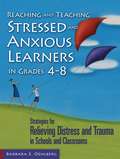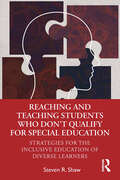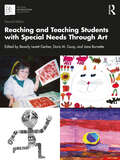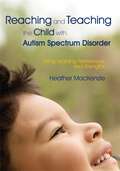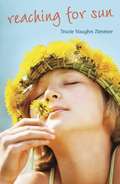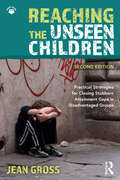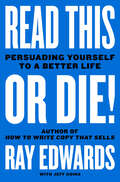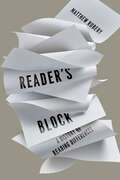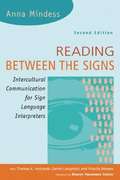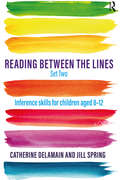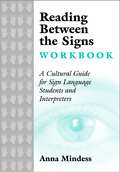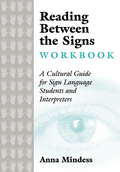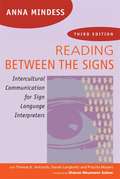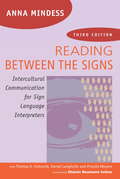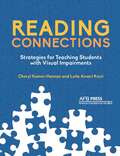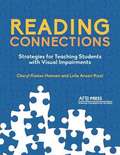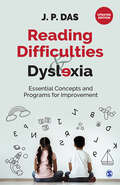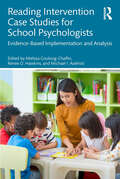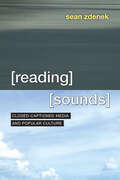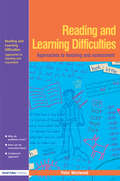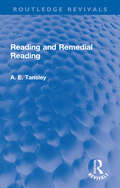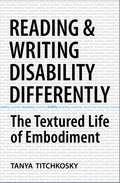- Table View
- List View
Reaching and Teaching Stressed and Anxious Learner: Strategies for Relieving Distress and Trauma in Schools and Classrooms
by Barbara OehlbergThis important new resource helps educators understand how trauma and stress interfere with cognitive skills, and how classroom and school activities can be used to restore feelings of safety, empowerment, and well-being.
Reaching and Teaching Students Who Don’t Qualify for Special Education: Strategies for the Inclusive Education of Diverse Learners
by Steven R. ShawThis book helps readers understand, teach, and support children with persistent low academic achievement who don’t meet special education eligibility criteria, or for whom Tier 2 MTSS interventions are insufficient. Designed to be implemented in inclusive classrooms with minimal resources, comprehensive chapters cover topics from reading, writing, and math to executive functions, SEL, and mental health. This critical, ground-breaking volume provides teachers, psychologists, and counselors with an understanding of the issues children and adolescents with mild cognitive limitations and other causes of low academic achievement face, as well as detailed, evidence-based teaching practices to support their academic and social and emotional learning.
Reaching and Teaching Students with Special Needs Through Art
by Beverly Levett Gerber Doris M. Guay Jane BurnetteThis second edition of Reaching and Teaching Students with Special Needs Through Art is written for art educators, special educators, and those who value the arts for students with special needs. It builds on teachers’ positive responses to the first edition, and now combines over 700 years of the educational experience of arts and special educators who share their art lessons, behavior management strategies, and classroom stories. The revised second edition provides updated chapters addressing students with emotional/behavioral disabilities, learning disabilities, intellectual disabilities, physical disabilities, and visual and hearing impairments.The newly revised second edition includes chapters on students with autism spectrum disorder, preschool students, and students experiencing trauma. All chapters have been updated to include current definitions and language, recommended teaching strategies, art lesson adaptations, behavior management strategies, and references to related chapters. Follow-up activities are provided for further insights into each group of students. A new summary chapter connects how the authors’ collaborations resulted in changes to two professional organizations. Since the first edition, many of the featured authors established the new Division of Visual and Performing Arts Education (DARTS) at the Council for Exceptional Children (CEC) and earlier, formed a new National Art Education Association (NAEA) Interest group—Special Needs in Art Education (SNAE), now Arts in Special Education (ASE).This edition is ideal for preservice arts methods courses and education courses on accessibility and inclusion at the undergraduate and graduate levels. It continues to offer current yet proven best practices for reaching and teaching this ever-important population of students through the arts.
Reaching and Teaching Students with Special Needs through Art
by Beverly Levett Gerber Doris M. GuayThis book has played an important role in reaching and teaching special needs students; its compiled in a simple manner to provide access to its audience. It contains practices, research, and the rationale for art in the education of students with special needs.
Reaching and Teaching the Child with Autism Spectrum Disorder: Using Learning Preferences and Strengths
by Heather MackenzieReaching and Teaching Children with Autism provides a positive approach to understanding and educating children on the autism spectrum. The book gives greater insight into the perspective and behavior of a child with autism and explores how the child's learning preferences, strengths and interests can be used to facilitate learning and enhance motivation. Based on well-researched theory and extensive clinical experience, the author provides a comprehensive model for developing lifelong independent learning skills in children with autism between the ages of 3 and 12 years old. The book describes the underlying principles, learning preferences and strengths typical of children with autism and offers a detailed but flexible program structure based on these concepts. Easy to follow activities and approaches are described in each chapter, along with clear examples and illustrations. This accessible and practical book is an essential resource for parents, teachers, support workers, therapists and others concerned with learning and development in children with autism.
Reaching for Sun
by Tracie Vaughn ZimmerJosie Wyatt knows what it means to be different. Her family's small farmhouse seems to shrink each time another mansion grows up behind it. She lives with her career-obsessed mom and opinionated Gran, but has never known her father. Then there's her cerebral palsy: even if Josie wants to forget that she was born with a disability, her mom can't seem to let it go. Yet when a strange new boy--Jordan--moves into one of the houses nearby, he seems oblivious to all the things that make Josie different. Before long, Josie finds herself reaching out for something she's never really known: a friend... and possibly more. Interlinked free verse poems tell the beautiful, heartfelt story of a girl, a family farm reduced to a garden, and a year of unforgettable growth.<P><P> Winner of the Schneider Family Book Award
Reaching the Unseen Children: Practical Strategies for Closing Stubborn Attainment Gaps in Disadvantaged Groups
by Jean GrossThis new edition of the best-selling Reaching the Unseen Children provides a powerful and accessible resource for schools working to close the attainment gap between disadvantaged children, particularly white pupils from low-income backgrounds, and their peers.It tackles head-on the issues currently confronting schools, with new content on early years and on attendance, reflecting deeply worrying data showing that almost two in five disadvantaged pupils were persistently absent in the last school year. Firmly located in the current educational policy context, it incorporates the latest science – on how we can develop oracy, for example, on new approaches to teaching reading, and on why belonging, school connectedness, and agency are emerging as critical to the success of disadvantaged learners. The second edition includes many new case studies from outstanding schools which have successfully drawn on and developed ideas from the first edition, making them their own.Bringing together the latest data, research, and stories from schools that have made the difference to close the gap, Reaching the Unseen Children remains an essential guide for anyone working in education today who is seeking equity for all their pupils.
Read This or Die!: Persuading Yourself to a Better Life
by Jeff Goins Ray EdwardsDiagnosed with a terminal illness, a leading marketing consultant discovers that what he has learned about persuading others might help him save his own life. Ray Edwards was one of the top marketers and copywriters in the business with A-list clients like Tony Robbins, Jack Canfield, and Michael Hyatt when he was diagnosed with Parkinson’s. The diagnosis brought his life to a screeching halt and propelled Edwards to question everything he thought he knew about his Christian faith, his relationships, what kind of person he was, and how the world worked.Out of options and deeply depressed, Edwards decided he needed to turn his life around or die a failure. He had to let go of false beliefs and find better ones. To his surprise, he found that the principles of persuasion he’d honed for over four decades to move others could work for him. In the vein of The Last Lecture and Tuesdays with Morrie, Read This or Die! Is the tale of one man’s transformation and how he achieved it.Edwards outlines the powerful, time-tested PASTOR process he created that helped him identify and untangle the beliefs that were holding him back and provided a game plan for how to change his life:Pain: start with what hurtsAmplify: determine how it will get worse before it gets betterStory: find the story of a better futureTransformation: choose the evidence worth believingOpportunity: discern where change can happenResponse: set up a system that makes transformation stickFor anyone who wants to turn their life around but does not know how, the PASTOR method teaches how to harness marketing wisdom to get honest about what we really want from life and craft better beliefs and plans to help us start living life on our own terms.
Reader's Block: A History of Reading Differences
by Matthew RuberyWhat does the term "reading" mean? Matthew Rubery's exploration of the influence neurodivergence has on the ways individuals read asks us to consider that there may be no one definition. This alternative history of reading tells the stories of "atypical" readers and the impact had on their lives by neurological conditions affecting their ability to make sense of the printed word: from dyslexia, hyperlexia, and alexia to synesthesia, hallucinations, and dementia. Rubery's focus on neurodiversity aims to transform our understanding of the very concept of reading. Drawing on personal testimonies gathered from literature, film, life writing, social media, medical case studies, and other sources to express how cognitive differences have shaped people's experiences both on and off the page, Rubery contends that there is no single activity known as reading. Instead, there are multiple ways of reading (and, for that matter, not reading) despite the ease with which we use the term. Pushing us to rethink what it means to read, Reader's Block moves toward an understanding of reading as a spectrum that is capacious enough to accommodate the full range of activities documented in this fascinating and highly original book. Read it from cover to cover, out of sequence, or piecemeal. Read it upside down, sideways, or in a mirror. For just as there is no right way to read, there is no right way to read this book. What matters is that you are doing something with it—something that Rubery proposes should be called "reading."
Reader's Digest Select Editions, Volume 126 (Reader's Digest #126)
by Inc. Reader's Digest AssociationThis Reader's Digest volume consists of two condensed selections: Chesapeake Blue by Nora Roberts, and, Eat Cake by Jeanne Ray. The first selection, Chesapeake Blue is about "Seth Quinn, a gifted international artist, returns home to Maryland ready to settle down. But a daring new passion collides with a dark secret from his past, and his life becomes anything but settled." The second condensed book, Eat Cake is about how cake brings a family through crises: "Nothing brings a family together like a warm, delicious slice of cake! Or so believes Ruth Hopson, who bakes so much that her husband, mother, and teenage daughter beg her to stop. But little does Ruth know how important her baking will become to her family when life takes a turn for the worse--and Ruth discovers a strength she didn't even know she had."
Reading Between The Signs: Intercultural Communication for Sign Language Interpreters
by Anna Mindess Thomas K. Holcomb Daniel Langholtz Priscilla Moyers Sharon Neumann SolowIn Reading Between the Signs: Intercultural Communication for Sign Language Interpreters, Anna Mindess provides a new perspective on a unique culture that is not widely understood-American Deaf culture. With the collaboration of three distinguished deaf consultants, Mindess explores the implications of cultural differences at the intersection of the deaf and hearing worlds. The book takes a practical approach with many useful suggestions for the sign language interpreter. Mindess provides several helpful dialogues between hearing and deaf Americans in a variety of situations to illustrate the problems that can arise as a result of cultural differences. The compounded difficulty of communicating with a deaf person from another country is addressed as well, with suggestions for ameliorating possible areas of misunderstanding. It also provides helpful information about advances in technology and the multicultural communities within the Deaf world. Reading Between the Signs is an invaluable tool for those interested in training as a sign language interpreter, but further, for anyone wishing to understand American Deaf culture. . A dazzling application of the tools of intercultural communication to illuminating Deaf and hearing cultures and their differences. . This is a book for everyone interested in Deaf culture. -Harlan Lane, author of When the Mind Hears and The Mask of Benevolence Adds a necessary dimension to understanding what sign language interpretation really entails-not the exchange of words for signs and vice versa but the translation of one view of life and all its meanings into another equally valid yet different view -William C. Stokoe, Former Professor Emeritus, Gallaudet University BRAVO The book is outstanding - well written, informative, and desperately needed in our field . -Jan Humphrey, Ed. D. Certified Interpreter, Interpreter Educator and Author of So You Want to Be an Interpreter?A must-read An enlightening book. a defining document in the literature of Deaf culture. -Eileen Forestal, Professor, ASL Studies and Interpreting Training, Union County College Contents Foreword by Sharon Neumann So low Preface Acknowledgments Part One: Background 1 Introduction 2 The Study of Culture 3 Selected Topics in Intercultural Communication 4 Do Americans Really Have a Culture? 5 American Deaf Culture 6 Multicultural Deaf Culture 7 Culture, Change, and Technology Part Two: Practical Applications 8 The Impact of Cultural Differences on Interpreting Situations 9 Multicultural Interpreting Challenges 10 The Interpreter's Role and Responsibilities 11 Techniques for Cultural Adjustments12 Interpreting in a Virtual World 13 Cultural Sensitivity Shouldn't End at Five O'Clock Afterword by Dr. Thomas K. Holcomb Bibliography About the Author and Contributors Index.
Reading Between the Lines Set Two: Inference skills for children aged 8 – 12
by Catherine Delamain Jill SpringReading Between the Lines Set Two is a sequel to the popular Reading Between the Lines. It is a resource book for teachers, teaching assistants, SENCOs and Speech and Language Therapists who need to support the development of inference skills in children aged 8–12. These unique guides offer accessible and easy-to-use material specifically targeted to improve inference, which is a crucial element in understanding spoken and written language. The book provides 370 engaging texts themed around different areas such as place and occupation, and includes short stories about everyday events, magic and adventure. Each short text is accompanied by guiding questions and is carefully graded to allow students to gradually progress from more simple texts with highlighted clues onto more challenging scenarios which will require higher level inferencing skills. Containing handy photocopiable material, this guide can be used with whole classes, small groups or individual children. It will be particularly valuable to professionals working with children who have Autism Spectrum Disorders or Speech, Language and Communication Needs, who need particular support with inference as they develop their broader social communication skills.
Reading Between the Signs Workbook: A Cultural Guide For Sign Language Students And Interpreters
by Anna MindessIn Reading Between the Signs, Anna Mindess provides a perspective on a culture that is not widely understood-American Deaf culture. With the collaboration of three distinguished Deaf consultants, Mindess explores the implications of cultural differences at the intersection of the Deaf and hearing worlds. Used in sign language interpreter training programs worldwide, Reading Between the Signs is a resource for students, working interpreters and other professionals. This important new edition retains practical techniques that enable interpreters to effectively communicate their clients' intent, while its timely discussion of the interpreter's role is broadened in a cultural context.NEW TO THIS EDITION: New chapter explores the changing landscape of the interpreting field and discusses the concepts of Deafhood and Deaf heart. This examination of using Deaf interpreters pays respect to the profession, details techniques and shows the benefits of collaboration.
Reading Between the Signs Workbook: A Cultural Guide for Sign Language Students and Interpreters
by Anna MindessThis helpful workbook functions as a companion and supplement to Anna Mindess's earlier book, Reading Between the Signs: A Cultural Guide for Sign Language Interpreters, a recognized classic text for sign language interpreters and ASL students. It is arranged to correspond with the theory presented in the book and expands its focus to the relativity of politeness and the distinction between direct and indirect communication styles, both of which are important elements in comparing Deaf and mainstream cultures. Hands-on exercises allow students to better comprehend the sometimes-puzzling differences of culturally appropriate behavior. The book also helps students explore their own culture as well as the American Deaf culture in ways that reveal the differences between the two. Role play, discussion topics and critical incidents increase first-hand understanding of the relationship between the Deaf and Hearing communities.
Reading Between the Signs: Intercultural Communication For Sign Language Interpreters
by Anna MindessIn Reading Between the Signs, Anna Mindess provides a perspective on a culture that is not widely understood-American Deaf culture. With the collaboration of three distinguished Deaf consultants, Mindess explores the implications of cultural differences at the intersection of the Deaf and hearing worlds. Used in sign language interpreter training programs worldwide, Reading Between the Signs is a resource for students, working interpreters and other professionals. This important new edition retains practical techniques that enable interpreters to effectively communicate their clients' intent, while its timely discussion of the interpreter's role is broadened in a cultural context.NEW TO THIS EDITION: New chapter explores the changing landscape of the interpreting field and discusses the concepts of Deafhood and Deaf heart. This examination of using Deaf interpreters pays respect to the profession, details techniques and shows the benefits of collaboration.
Reading Between the Signs: Intercultural Communication for Sign Language Interpreters
by Anna MindessIn Reading Between the Signs, Anna Mindess provides a perspective on a culture that is not widely understood - American Deaf culture. With the collaboration of three distinguished Deaf consultants, Mindess explores the implications of cultural differences at the intersection of the Deaf and hearing worlds. Used in sign language interpreter training programs worldwide, Reading Between the Signs is a resource for students, working interpreters and other professionals. This important new edition retains practical techniques that enable interpreters to effectively communicate their clients' intent, while its timely discussion of the interpreter's role is broadened in a cultural context. NEW TO THIS EDITION: New chapter explores the changing landscape of the interpreting field and discusses the concepts of Deafhood and Deaf heart. This examination of using Deaf interpreters pays respect to the profession, details techniques and shows the benefits of collaboration.
Reading By Touch: Trials, Battles, and Discoveries
by Pamela LorimerHistory of reading for the blind.
Reading Connections
by Cheryl Kamei-Hannan Leila Ansari RicciReading Connections: Strategies for Teaching Students with Visual Impairments offers an in-depth and user-friendly guide for understanding reading instruction for teachers and professionals seeking to improve the reading skills of their students who are visually impaired. The book addresses in detail the essential components of reading--phonemic awareness, phonics, reading fluency, vocabulary, and reading comprehension--as well as other key reading components and subskills. While this book addresses the needs of students who read print, braille, or both, much of the book is also consistent with strategies for teaching reading to students who have, or are at risk for, developing reading disabilities. Teachers of students with visual impairments, as well as family members and other professionals who work with children who are blind or visually impaired, will find within this book a repertoire of strategies and activities for creating a balanced, comprehensive plan of reading instruction for each student and for teaching the essential reading skills necessary for students' success.
Reading Connections: Strategies For Teaching Students With Visual Impairments
by Cheryl Kamei-HannanReading Connections: Strategies for Teaching Students with Visual Impairments offers an in-depth and user-friendly guide for understanding reading instruction for teachers and professionals seeking to improve the reading skills of their students who are visually impaired. The book addresses in detail the essential components of reading--phonemic awareness, phonics, reading fluency, vocabulary, and reading comprehension--as well as other key reading components and subskills. While this book addresses the needs of students who read print, braille, or both, much of the book is also consistent with strategies for teaching reading to students who have, or are at risk for, developing reading disabilities. Teachers of students with visual impairments, as well as family members and other professionals who work with children who are blind or visually impaired, will find within this book a repertoire of strategies and activities for creating a balanced, comprehensive plan of reading instruction for each student and for teaching the essential reading skills necessary for students' success.
Reading Difficulties and Dyslexia: Essential Concepts and Programs for Improvement
by J.P. DasPreviously, dyslexia was defined as primarily a deficit at the word reading level. When the original edition of this book was published, the core deficit was thought to be phonological coding. The search for a single factor for dyslexia is no longer pursued. However, we must explore why approximately 15 per cent of school children have difficulties in learning to read or doing math. This updated edition offers an explanation based on contemporary developments in the study of cognition and neuroscience. It also studies the impact of poverty on learning, a relatively new but extremely important area of interest. Going beyond a simple view of reading and math, Reading Difficulties and Dyslexia discusses distal factors such as cognitive flexibility and attentional control. A distinguishing feature of this book is that it presents intervention programmes, based on the distal factors, which can greatly improve word decoding and comprehension, and enhance number sense.
Reading Intervention Case Studies for School Psychologists: Evidence-Based Implementation and Analysis
by Michael I. Axelrod Melissa Coolong-Chaffin Renee O. HawkinsReading Intervention Case Studies for School Psychologists provides vivid, real-world examples of school-based interventions targeting students’ phonological awareness, phonics, fluency, and comprehension in reading. This book offers a rich variety of applied reading interventions in school settings , spanning strategies such as incidental teaching, word boxes, peer tutoring, taped words, story mapping, and beyond. Each case includes thorough descriptions of the specific area of concern, detailed intervention protocols, data collection and analysis methods, and tips for ensuring social acceptability and treatment integrity. School psychologists, along with related professionals in special education, general education, and speech-language pathology, will come away with new insights into this comprehensive set of well-researched and frequently applied reading interventions.
Reading Sounds: Closed-Captioned Media and Popular Culture
by Sean ZdenekImagine a common movie scene: a hero confronts a villain. Captioning such a moment would at first glance seem as basic as transcribing the dialogue. But consider the choices involved: How do you convey the sarcasm in a comeback? Do you include a henchman's muttering in the background? Does the villain emit a scream, a grunt, or a howl as he goes down? And how do you note a gunshot without spoiling the scene? These are the choices closed captioners face every day. Captioners must decide whether and how to describe background noises, accents, laughter, musical cues, and even silences. When captioners describe a sound--or choose to ignore it--they are applying their own subjective interpretations to otherwise objective noises, creating meaning that does not necessarily exist in the soundtrack or the script. Reading Sounds looks at closed-captioning as a potent source of meaning in rhetorical analysis. Through nine engrossing chapters, Sean Zdenek demonstrates how the choices captioners make affect the way deaf and hard of hearing viewers experience media. He draws on hundreds of real-life examples, as well as interviews with both professional captioners and regular viewers of closed captioning. Zdenek's analysis is an engrossing look at how we make the audible visible, one that proves that better standards for closed captioning create a better entertainment experience for all viewers.
Reading and Learning Difficulties: Approaches To Teaching And Assessment
by Peter WestwoodFirst Published in 2005. Routledge is an imprint of Taylor & Francis, an informa company.
Reading and Remedial Reading (Routledge Revivals)
by A. E. TansleyFirst published in 1967, Reading and Remedial Reading describes the normal reading programme in the school where the author taught and the diagnosis and treatment of acute difficulties in learning to read. The work deals mainly with so-called educationally maladjusted children, many of whom showed signs of possible damage to the central nervous system, but Mr Tansley believes that the methods and techniques given are applicable to all children, irrespective of levels of intelligence, who are experiencing difficulties to learn. The results achieved are most encouraging and have been tested by numerous expert visitors from this country and abroad. This is a helpful guide to a large number of people- staffs and students in University Education Departments, educational psychologists, remedial teachers, special-school teachers, primary school teachers, and medical officers in the School Health Service.
Reading and Writing Disability Differently: The Textured Life of Embodiment
by Tanya TitchkoskyIn this study, Titchkosky analyzes the depiction of disabled people in the mass media. Through an examination of everyday texts such as news stories and government surveys, she uncovers and critiques a Western cultural assumption that sees disability as a clear-cut "problem" in need of a solution. Titchkosky (disability studies, U. of Toronto) is also the author of Disability, Self, and Society (2003). Annotation ©2007 Book News, Inc., Portland, OR (booknews.com)
